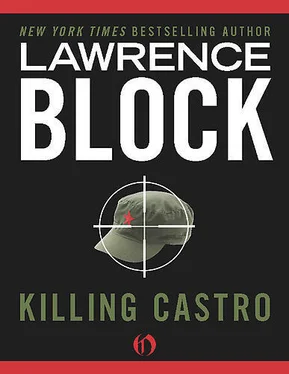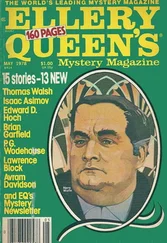He left the hotel. The maid would find a surprise in the morning. If they had maids in such a dump. And if anything could surprise them.
He laughed, a quick private laugh. Then he caught a cab and rode to the Splendora.
The Splendora was a medium-priced hotel in downtown Tampa where Garrison was registered under the name of David Palmer. He went to his room on the top floor and packed his suitcase. That wasn’t difficult—Garrison traveled light. The suitcase, when full, contained one lightweight cord suit, one pair of tennis sneakers, two summer shirts, a few changes of underwear and a few pairs of socks. There was one book, a slim volume of poems by Rimbaud. Garrison did not read much but he happened to like Rimbaud. He carried his suitcase to the lobby, paid his bill and checked out. He left no forwarding address.
His car, an old blue Ford, was parked near the Splendora. He had bought the car in New Orleans a week ago as David Palmer and had driven it to Tampa. Now he put his suitcase in the trunk and locked it. There was a gun in the trunk, a high-powered rifle with a scope sight that had cost a little more than the car. It, too, had been purchased in New Orleans. He got behind the wheel and drove out of Tampa.
Garrison was thirty-seven. In 1924, while Coolidge was being re-elected President of the United States, Ray Garrison was being born in a town about as far from Tampa as you could go without leaving the country. The town was Birch Fork, in Washington, a very small town in the central part of the state. He lived in Birch Fork for seventeen years. Then he enlisted in the Marine Corps.
When he thought about it, which happened rarely, it occurred to him that the history of those seventeen years in Birch Fork was best told in terms of the weapons he had owned. He was, first, a solitary child and, next, a solitary youth. He spent those early years in the woods. He never went without a weapon.
When he was seven he made a slingshot. The stock was made of strong wood and the sling was a stout rubber band. The slingshot was inaccurate at first, but he worked on it and with it, practicing constantly. Before long he was able to get squirrels and jack rabbits, sometimes a bird or two. He didn’t kill the small game out of blood lust but simply for target practice. It just wasn’t the same when you shot at pop bottles or tin cans. You needed a living target to make it all real.
When he was eleven his father bought him a BB gun for his birthday. He loved the gun, but it was inexpensive and the barrel was untrue. First he learned to make up for the gun’s inaccuracy by aiming a little high and wide. Then one day the gun irritated him. He took it apart, hammered out the slight dent that was ruining the gun’s aim, and put it back together again.
Three years later he got a .22. This he bought himself, out of money he had earned at odd jobs and chores, and it was a beautiful gun with a highly polished stock and gleaming metal parts. This was a real gun, not a toy, and he was good with it. A year or two later he added a shotgun to his collection. He hadn’t liked shotguns at first—the wide pattern they cast seemed to him to be making things too easy for the hunter—but he quickly learned the subtleties of the shotgun and grew to like it.
He never ate what he killed, never brought it home, never stuffed it, skinned it or mounted it. He was interested in guns, and in the sport. He was not interested in dead bodies.
Then 1941, and Pearl Harbor, and the Marines. He was in all the way, in for the whole Pacific campaign, jumping from one ugly little island to the next, with men dying around him and in front of him. He used an M-1, a BAR and a machine gun. He learned hand-to-hand combat. He lived in death’s presence, and looked it squarely in the face. He thought often of death, wondered about it, hoped he would avoid it. He went through the war without a wound, without a scratch.
And the war was over. The Marines knocked off Guadalcanal and Tarawa and Iwo and the rest, and then some bastard of a flyboy pushed a lever and stole the show. A bomb hit Hiroshima, and a few days later another one hit Nagasaki, and then the war was over and he came back to the States again.
When he got back to Birch Fork his home was gone. His mother and father were dead, and there was no reason to stick around. One day he went into the woods with his rifle and took a shot at a squirrel or two, but the thrill was gone. When you were used to hunting men you didn’t get much kick taking pot shots at a squirrel. He packed, again, and headed for Chicago.
For a few years he floated. Then one night in a bad section of St. Louis a man started a fight and pulled a knife on Garrison. Ray took it away from him and broke the blade on the bar top. Then, with his hands, he beat the other man to death.
The police didn’t get there in time. They’d been nowhere near the place and by the time they got there Ray was in a fat man’s apartment. The man told Garrison he was okay, there was work for someone like him. He asked Garrison was he good with a gun and Garrison just smiled.
That’s ancient history, he thought now, the car hugging the road and heading south from Tampa. Ancient history. All those years with the mob, all those syndicate jobs for fast, clean cash, they were done with. The syndicate wanted too much. They wanted to own you, and Garrison didn’t want to be owned. So he worked freelance now. He worked for whoever hired him, did an average of four jobs a year, at an average of five grand a job. When not on an assignment, which was ninety percent of the time, he loafed. He floated around the country, stayed in good hotels, read Rimbaud. He liked Rimbaud.
He was in Key West in the morning. The little island was quiet, warm. He parked the car in a field, unlocked the trunk, broke down the high-powered rifle and packed it in his suitcase with his clothes. He went through his wallet, destroyed the few pieces of identification made out to David Palmer. He didn’t need the car now, didn’t need Palmer. He picked up the suitcase and lugged it down the main street of the town. He stopped at a restaurant for breakfast, ate a double order of ham and eggs and drank a quart of cold milk.
The counterman was short and bald. “I want to charter a boat,” Garrison told him.
“Fishing?”
Garrison shrugged. “A speedy little launch. Something quick and easy. Who do I see?”
The counterman thought about it. “Try Phil Di Angelo,” he suggested. “You can most times find him down at the fourth pier, or at the Blue Moon, it’s a bar down there.”
Garrison thanked him and left. He tried the docks and didn’t find Di Angelo. In the Blue Moon the bartender pointed to a dark, unshaven man sitting alone with a bottle of beer at a table in the back. Garrison carried his suitcase across the dirty floor and sat down near Di Angelo. The man looked up. He had been drinking, Garrison saw, but he was not drunk.
“You’ve got a boat for hire,” Garrison said.
Di Angelo looked at him. “You wanta hire her?”
“I might. Is she fast?”
“Fast and trim. The fishing’s so-so now, not too good and not too bad. You won’t get a sail, if that’s what you’re looking for. No sail and no tarpon. We might have some fun.”
“I don’t fish.”
“No?” Di Angelo’s eyes were shrewd, appraising. “Go on, man.”
Garrison said “I want to go to Cuba. Havana.”
“You crazy?”
“No.”
“You must be crazy.”
Garrison didn’t say anything. He waited for Di Angelo to make up his mind.
“I could do it, man. It’ll cost you.”
“How much?”
“A grand.”
Garrison sighed. He stood up and started to leave.
“Hey—”
“It’s too much,” he said.
“How much, then?”
Читать дальше












